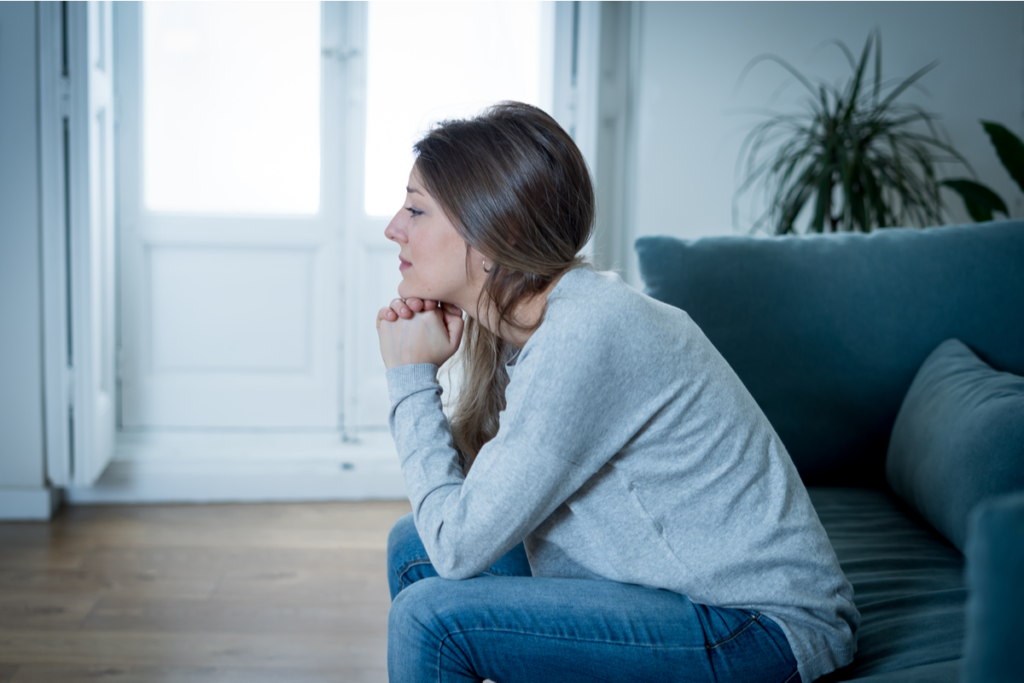How to Stop Comparing Yourself to Others

Comparing yourself to others isn’t necessarily a bad thing. As a matter of fact, it’s often considered an essential and inevitable process in our daily routines. The problem occurs when it becomes recurrent and starts to determine your personal worth.
For example, you might find that, in order to feel better about yourself, you need to value yourself in relation to others. Furthermore, you may contrast your achievements and failures with them too. Consequently, you might be fixing your worth by the comparisons you make. This, in addition to hurting you, isn’t fair to you, since your mood will depend on it to great extent.
Next, we’ll give you some compelling reasons to stop comparing yourself with others. We’ll also tell you how to do it.

Reasons to stop comparing yourself to others
Some of the negative consequences that might arise due to comparing yourself to others are the following:
- You waste time. When you constantly compare yourself with others, you focus on what you don’t have, instead of what you do have and can strengthen. Also, the comparison means you’re focussing on another person who has nothing to do with you. In fact, their personal story is totally different, so it doesn’t make much sense at all to compare yourself with them. Therefore, keep in mind that the only way to improve is by focusing on yourself.
- You weaken your self-esteem. Comparing yourself with others leads you to think that your life or your situation is less favorable than that of others in general. It can also lead you to underestimate your achievements, your strengths, your qualities, etc. In the long run, this will undermine your safety and dignity, causing you to reject yourself.
- Your mood lowers. Comparisons, when they’re downward, usually affect how you feel in a negative way. That’s because they focus your attention on what you don’t have or the mistakes you’ve made.
- It prevents you from establishing healthy relationships. If you’re constantly comparing yourself with others and trying to be better than them, it’ll be difficult for you to establish lasting and quality relationships. In fact, comparison often arouses feelings of envy and competitiveness with other people who are close to you.
Tips to stop comparing yourself to others
It won’t be easy to break this habit, basically because it’s become an automated process. However, with practice and little by little, it’s possible. These tips can help you.
1. Accept that you compare yourself to others
If you’re unable to recognize that you live your life comparing yourself with others, you won’t solve anything. Therefore, the first step is to accept this reality. It sounds simple, but it isn’t. Therefore, it’s essential that you’re alert so you can take action on the matter.
2. Be aware of the damage you’re doing to yourself
Reflect on the effects that comparisons with others have on you. How do they make you feel? What are they leading you to do?
As a matter of fact, you’re causing yourself unnecessary discomfort while the other person completely disregards what you’re doing.
3. Reduce your time on social media
This advice may seem strange to you, but nowadays social networks have great weight in your everyday life. On these platforms, most people only show the positive aspects of their life, which gives the impression that they have no problems or difficulties. Therefore, it’s easy to fall into the trap of believing that you’re not up to par or you’re not good enough.
In reality, nobody tends to show their defects, weaknesses, or problems on social networks. Therefore, comparisons in this area are formed through illusions. For this reason, we recommend limiting your time on these platforms in order to stop comparing yourself to others.
4. Focus on learning, rather than competing
Nobody’s perfect. In fact, feeling bad when comparing yourself to others is a sign that you’re not humble enough to accept that it’s possible to learn from someone else.
Therefore, if you’re going to compare yourself, it should be from an attitude of learning and inspiration. Thus, the comparison, instead of causing you discomfort, will be rewarding and enriching.
5. Make peace with imperfection
We repeat, nobody’s perfect. Neither will anyone of us ever be. That’s because we can always learn and improve ourselves. To have a fuller life you have to be able to develop a good attitude towards your mistakes and defeats. Only then can you get the best out of them and learn.
By comparing yourself with others, you distance yourself from the possibility of continuing to learn. Furthermore, you maintain the false illusion that you need the other person to be inferior in order to feel good about yourself.

6. Ask yourself where you want to go
One of the most important aspects is to be clear about what you want to achieve. Ask yourself what your objectives and goals are in relation to your values. Then, think about how you can achieve them. For example, what are you going to do to express yourself better or to be more organized? What are the steps you need to follow toward your goals?
As a matter of fact, it’s all about focussing on yourself, rather than others. It means occupying your time on what you’re able to do to fulfill your objectives. You also might want to review some of them to see if they might need adjusting.
Stopping comparing yourself to others isn’t easy. However, it’s always worth it. It helps you move from feeling a distinct lack of something to having a better relationship with yourself. The kind of relationship where you’re a good friend to yourself instead of your main enemy.
However, if you feel that this situation is overwhelming you, don’t hesitate to seek psychological help. A mental health specialist will offer you the right tools to hel you stop comparing yourself to others.
Comparing yourself to others isn’t necessarily a bad thing. As a matter of fact, it’s often considered an essential and inevitable process in our daily routines. The problem occurs when it becomes recurrent and starts to determine your personal worth.
For example, you might find that, in order to feel better about yourself, you need to value yourself in relation to others. Furthermore, you may contrast your achievements and failures with them too. Consequently, you might be fixing your worth by the comparisons you make. This, in addition to hurting you, isn’t fair to you, since your mood will depend on it to great extent.
Next, we’ll give you some compelling reasons to stop comparing yourself with others. We’ll also tell you how to do it.

Reasons to stop comparing yourself to others
Some of the negative consequences that might arise due to comparing yourself to others are the following:
- You waste time. When you constantly compare yourself with others, you focus on what you don’t have, instead of what you do have and can strengthen. Also, the comparison means you’re focussing on another person who has nothing to do with you. In fact, their personal story is totally different, so it doesn’t make much sense at all to compare yourself with them. Therefore, keep in mind that the only way to improve is by focusing on yourself.
- You weaken your self-esteem. Comparing yourself with others leads you to think that your life or your situation is less favorable than that of others in general. It can also lead you to underestimate your achievements, your strengths, your qualities, etc. In the long run, this will undermine your safety and dignity, causing you to reject yourself.
- Your mood lowers. Comparisons, when they’re downward, usually affect how you feel in a negative way. That’s because they focus your attention on what you don’t have or the mistakes you’ve made.
- It prevents you from establishing healthy relationships. If you’re constantly comparing yourself with others and trying to be better than them, it’ll be difficult for you to establish lasting and quality relationships. In fact, comparison often arouses feelings of envy and competitiveness with other people who are close to you.
Tips to stop comparing yourself to others
It won’t be easy to break this habit, basically because it’s become an automated process. However, with practice and little by little, it’s possible. These tips can help you.
1. Accept that you compare yourself to others
If you’re unable to recognize that you live your life comparing yourself with others, you won’t solve anything. Therefore, the first step is to accept this reality. It sounds simple, but it isn’t. Therefore, it’s essential that you’re alert so you can take action on the matter.
2. Be aware of the damage you’re doing to yourself
Reflect on the effects that comparisons with others have on you. How do they make you feel? What are they leading you to do?
As a matter of fact, you’re causing yourself unnecessary discomfort while the other person completely disregards what you’re doing.
3. Reduce your time on social media
This advice may seem strange to you, but nowadays social networks have great weight in your everyday life. On these platforms, most people only show the positive aspects of their life, which gives the impression that they have no problems or difficulties. Therefore, it’s easy to fall into the trap of believing that you’re not up to par or you’re not good enough.
In reality, nobody tends to show their defects, weaknesses, or problems on social networks. Therefore, comparisons in this area are formed through illusions. For this reason, we recommend limiting your time on these platforms in order to stop comparing yourself to others.
4. Focus on learning, rather than competing
Nobody’s perfect. In fact, feeling bad when comparing yourself to others is a sign that you’re not humble enough to accept that it’s possible to learn from someone else.
Therefore, if you’re going to compare yourself, it should be from an attitude of learning and inspiration. Thus, the comparison, instead of causing you discomfort, will be rewarding and enriching.
5. Make peace with imperfection
We repeat, nobody’s perfect. Neither will anyone of us ever be. That’s because we can always learn and improve ourselves. To have a fuller life you have to be able to develop a good attitude towards your mistakes and defeats. Only then can you get the best out of them and learn.
By comparing yourself with others, you distance yourself from the possibility of continuing to learn. Furthermore, you maintain the false illusion that you need the other person to be inferior in order to feel good about yourself.

6. Ask yourself where you want to go
One of the most important aspects is to be clear about what you want to achieve. Ask yourself what your objectives and goals are in relation to your values. Then, think about how you can achieve them. For example, what are you going to do to express yourself better or to be more organized? What are the steps you need to follow toward your goals?
As a matter of fact, it’s all about focussing on yourself, rather than others. It means occupying your time on what you’re able to do to fulfill your objectives. You also might want to review some of them to see if they might need adjusting.
Stopping comparing yourself to others isn’t easy. However, it’s always worth it. It helps you move from feeling a distinct lack of something to having a better relationship with yourself. The kind of relationship where you’re a good friend to yourself instead of your main enemy.
However, if you feel that this situation is overwhelming you, don’t hesitate to seek psychological help. A mental health specialist will offer you the right tools to hel you stop comparing yourself to others.
All cited sources were thoroughly reviewed by our team to ensure their quality, reliability, currency, and validity. The bibliography of this article was considered reliable and of academic or scientific accuracy.
- Castro Gerónimo, Abril y de la Villa Moral Jiménez, María (2017). USO PROBLEMÁTICO DE REDES SOCIALES 2.0 EN NATIVOS DIGITALES: ANÁLISIS BIBLIOGRÁFICO. Salud y drogas, 17 (1), 73-85. [Fecha de Consulta 24 de Septiembre de 2021]. ISSN: 1578-5319. Disponible en: https://www.redalyc.org/articulo.oa?id=83949782008
- Gómez L. (2005). Comparación social y autoevaluación desde un enfoque evolucionista. Escritos de psicología, 7: 2-14. Disponible en: https://dialnet.unirioja.es/servlet/articulo?codigo=1457425
- Vogel, E.; Rose, J.; Roberts, L. & Eckles, K. (2014). Social comparison, social media, and self-esteem. Psychology of Popular Media Culture, 3(4): 206- 222. Disponible en: https://doi.org/10.1037/ppm0000047
This text is provided for informational purposes only and does not replace consultation with a professional. If in doubt, consult your specialist.







